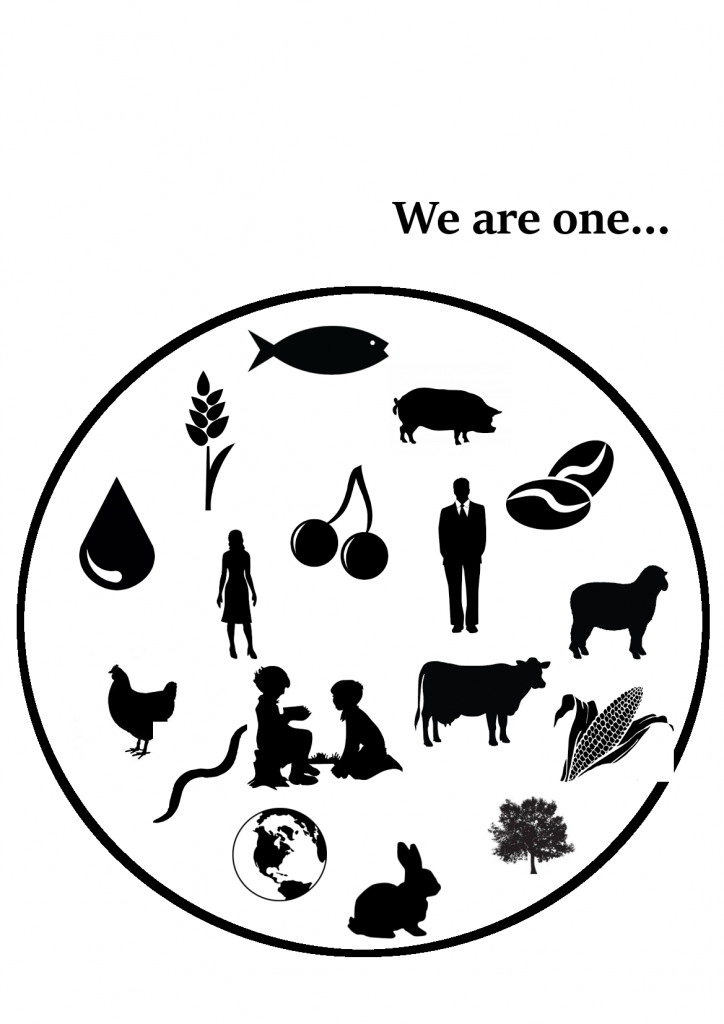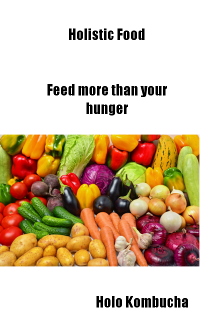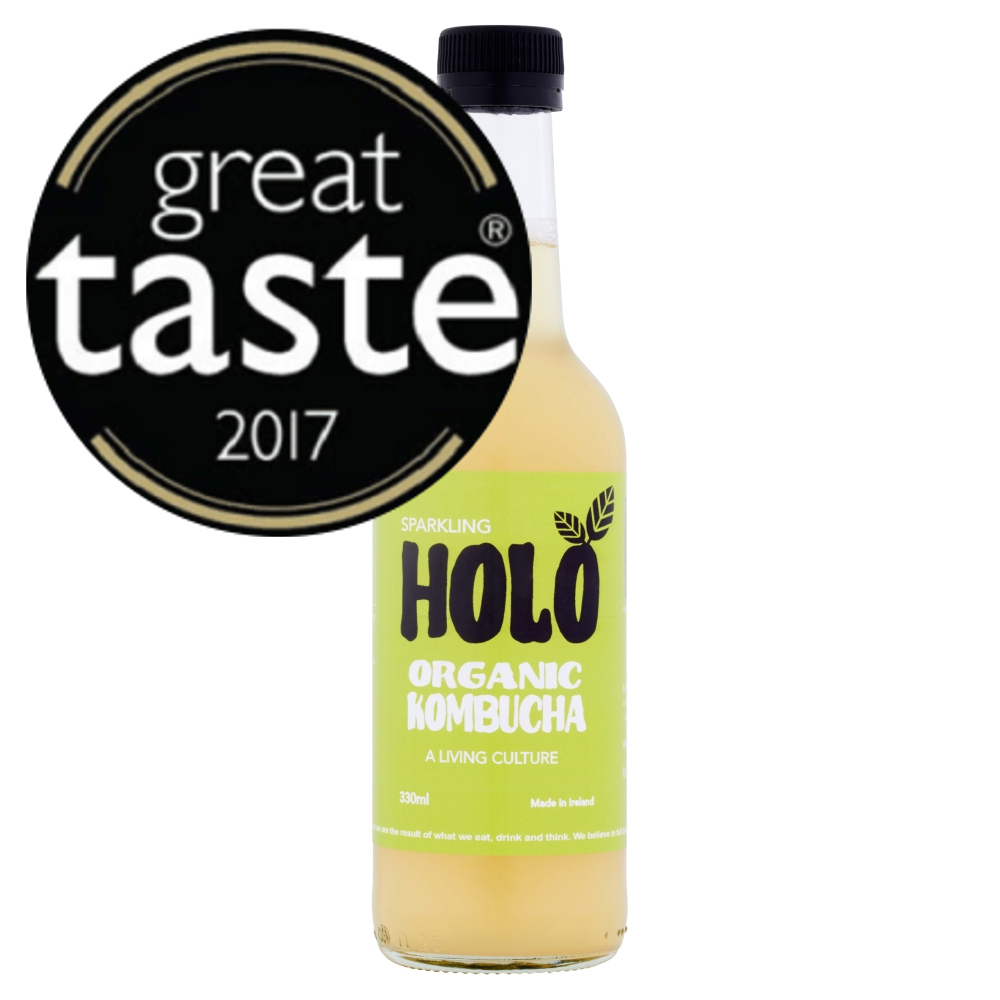What follows is a rough reconstruction of a presentation I gave at the West Waterford festival of Food.
Food. It’s something that permeates every aspect of our lives. From the moment we rise until we fall asleep, much our daily lives revolve around it. We’re all familiar with the food pyramid. Eat 5 a day fruit and veg and only now experts are saying our fruit and veg intake should be closer to 10 a day. Reduce the intake of fatty foods and so on.
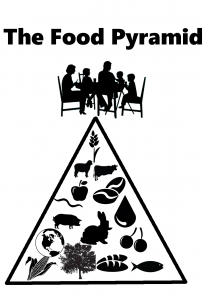 Here we have a typical family sitting atop the food chain and eating a balanced diet. Take no heed of the jumble of foods within the triangle, we’ll come back to that later.
Here we have a typical family sitting atop the food chain and eating a balanced diet. Take no heed of the jumble of foods within the triangle, we’ll come back to that later.
From the moment we’re born until we die what we eat affects us not just physically but on a deeper level. Food isn’t just something that keeps us running physically because it’s also a medicine. And modern medicine, with a few exceptions, is just that for the most part – a very concentrated form of food that has been extracted and refined – it seeks to treat an illness when we fall out of kilter.
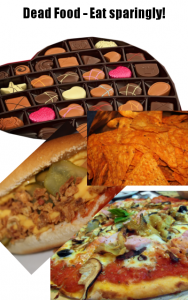 We seem to have gone down a path in modern times of treating food and eating it as just another consumable with little thought as to what it entails, how it has been produced and what it does to us. Dead Food, which to me is highly processed food that has been so processed and altered as to be devoid of easy nutritional substance, is a bug bear with me because while our bodies can consume it and extract material from it, it is to all intents and purposes of little value in keeping our bodies healthy. You can eat this food and your body will work really hard and overtime to keep you going, to extract what little nutrition is left in it. Dead Food for the most part is the food we are familiar with that comes in really attractive packaging, is easy to prepare and is usually the preserve of big companies.
We seem to have gone down a path in modern times of treating food and eating it as just another consumable with little thought as to what it entails, how it has been produced and what it does to us. Dead Food, which to me is highly processed food that has been so processed and altered as to be devoid of easy nutritional substance, is a bug bear with me because while our bodies can consume it and extract material from it, it is to all intents and purposes of little value in keeping our bodies healthy. You can eat this food and your body will work really hard and overtime to keep you going, to extract what little nutrition is left in it. Dead Food for the most part is the food we are familiar with that comes in really attractive packaging, is easy to prepare and is usually the preserve of big companies.
It is food that is designed to keep us buying more and more. Sweetners, cheap ingredients, artifical ingredients and ingredients that we don’t even know what they are! These are all the calling cards of foods that are made with an intention of profit rather than an intention of nutrition or of keeping you healthy. There is no goodness in them, either physically or holistically and what little is left, we can only extract through great effort.
That’s not to say we should avoid these foods completely. I think with modern life it can be extremely difficult to live a diet that is 100% organic and natural all of the time. But as we’ll see later, once we’re conscious of what we are eating, these types of foods won’t even be attractive to us as a source of nutrition over the long term.
In addition, the plethora of additives, preservatives, pesticides and toxins used in food are seeping into our bodies bit by bit. Cumulatively, the use of these substances across a whole range of foods and products that we eat and use means our bodies are not just extracting weak nutritional sustenance from our food, but also attempting to flush more toxins out of bodies at the same time.We are giving our bodies a double whammy of little nutrition and toxic intake at the same time.
The long term effect of stressing your body in this manner I believe means that you wear out faster. And so we reach a point in our lives where warning signs start appearing, and that’s different for each person. For some it will be 30 years of age, another will be 60 years young. But instead of correcting our diet, we start popping supplements and taking medication to suppress the warning signs but we fail to tackle the root cause of our illness – our diet and lifestyle.
 And that’s a problem that we’ve brought on ourselves very recently. We’re running from A to B trying to keep up a pace of life that has done away with a sense of self very much. We’re juggling careers, kids, family life and social life. We have become a race of multi taskers, never quiet present in the moment.
And that’s a problem that we’ve brought on ourselves very recently. We’re running from A to B trying to keep up a pace of life that has done away with a sense of self very much. We’re juggling careers, kids, family life and social life. We have become a race of multi taskers, never quiet present in the moment.
We have lost, or not so much lost but have forgotten, a lot of what ancient civilisations knew and practised. And while they may have been ancient, that’s not to say that they were backward. For the tools and technologies they had available to them, ancient civilisations were highly advanced and in tune with what we are only now re-discovering – that our sense of self is not just as a machine running on physical fuel, but that on a deeper level we are part of the whole and the whole is part of us. So the manner in which we live our lives affects not just us but those around us and those around them and so on until the universe itself is affected. Our very thoughts and actions are like a wave spreading out. Isn’t that a wonderful thought to have – that what you do, how you act, how you eat and the principles you hold can send ripples out into the universe where they have a much further and deeper impact than just you affecting you.
And we see that belief very much when you have children. All at once we’re anxious to teach our children all that we know, anxious that every bit of knowledge that we have and experience we’ve gained we’re trying to impart to them with a sense of urgency. That they won’t make the same mistakes that we have. The truth is that all our knowledge is probably passed onto our kids by the time they hit their teens. Even if we were never to meet our kids, our knowledge is passed on, it is built into everything that they are. And not only do they have all our knowledge, but they also have the knowledge of our parents, our grandparents, their parents again and so on – right back along, because that knowledge was also imparted to us. So all the knowledge of the ancients is there already within our children and within us – it’s just so often we’re afraid to put it to use because number one, we’ve forgotten it so busy are we with facebook and secondly, socially, we’re programmed to avoid appearing outside of the fold. And that’s a self defence mechanism that our brains impart to us. Don’t do this, don’t say that because living outside whatever the current social norms are means you could be singled out. That is a learned behaviour and self preservation technique – go with the herd, there is safety in numbers etc.
So food and the way we live our lives have always gone hand in hand. And we’ve a very real choice between recognising that what we eat and how we live leads to healthy holistic life or continuing on the way we are where we live unhealthy lives and then, when our lifestyle catches up with us of having to subject ourselves to drastic and intense medication in order to right our imbalances.
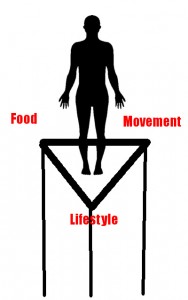 There are, I think, three things we need in order to find a balance within our lives and which I think are the three elements to holistic living – food obviously being one, exercise is the other and stress is the final one. I say stress because it’s probably a good catch all description for what I would otherwise have to describe as our work life, social life, inner life, our partnerships and community life. In other words, our lifestyle.
There are, I think, three things we need in order to find a balance within our lives and which I think are the three elements to holistic living – food obviously being one, exercise is the other and stress is the final one. I say stress because it’s probably a good catch all description for what I would otherwise have to describe as our work life, social life, inner life, our partnerships and community life. In other words, our lifestyle.
The word Holistic itself is derived from ‘the whole’, that we are more than just the sum of our parts. Holistically, we can’t be healthy if we just eat right while also being constantly unhappy at work. We can’t just be happy at work and overeat food all the time. We can’t be healthy if we exercise lots but take in the wrong food. We can’t be healthy if we eat right, exercise right but live an unhappy home life. To be truly healthy means being aware of all three and when we decide to be healthy on all three levels, we can come to a profound awareness of an inner happiness and sense of wellbeing.
Another way of looking at these three elements is of course mind, body and spirit(or soul). And because these three things are intertwined, we can use one to balance the others but this ability decreases with time. So if we are lacking in exercise, we can compensate by eating more healthy food but at some stage, we must begin exercising. If we are in a stressful environment, we can compensate by eating right and exercising more – it will rid the body of toxins caused by stress. But again, this is only a short term solution.
All of this isn’t some modern revelation – this stuff was well known in ancient civilisations. And when you begin reading about them and particularly the philosophies of diverse traditions and cultures from the Egyptians to the Asians to native Americans and indeed to our own celts, there are more similarities between them than there are differences – and these common themes from civilisations that were supposedly quiet distinct, separate, thousands of miles apart and backward. I often think that their blessing was that even though they only had 24 hours in the day too, they had a lot of more time to observe – or to be aware – of their own relationship to the larger whole, to the universe. Being aware and living consciously, was something that the ancients did that to a large extent, we don’t. Today, we’re rushing home and eating dinner while our minds are elsewhere – buried in the internet, or consumed by a problem at work, or being distracted by a constant stream of advertisements about more stuff that we don’t need. And speaking of advertising, it is designed to engender a sense of want in us, so that we are unhappy with what we already have. We want more and more. We have houses full of stuff, some of us even have to buy garden sheds and extend so much stuff we have.
We want to have the latest gadget, a better car, a larger house, better clothes – advertising creates in us a sense that somehow we don’t measure up. Either to those around us or some mythical, fantasy creation presented to us and which we’re promised we can have if we just buy this product. This sense of  want, is actually an artificially generated sense of stress. Our minds absorb what we are being told and because we’re so busy we never stop to think, in a conscious sense or being aware – do we actually need this product and is it critical that I have it? And when we fail to take a time out and be aware of what we’re chasing after, there never really is an end. There is no end to wanting more. There is always more and more and more. So when we go through life unaware, or living an unconscious life, we engender a sense of stress to which there is no end. We induce a sense of lifelong stress in chasing that more and more. But here’s the thing – we already have enough. We could live in houses that don’t cost thirty years of a mortgage, we could get from A to B in a car that is ten years old. We can access the internet on devices that are ten years old. So what exactly are we stressing about when we’re running around, consumed by work because we need to pay this and that and losing time to think about our very inner sense of self that is so critical to living a whole and full life? What is it that drives us to work so hard to afford a huge mortgage and that robs us of our ability to have time with ourselves and our kids and to develop our own life purpose, that robs us of the ability to live a holistic life?
want, is actually an artificially generated sense of stress. Our minds absorb what we are being told and because we’re so busy we never stop to think, in a conscious sense or being aware – do we actually need this product and is it critical that I have it? And when we fail to take a time out and be aware of what we’re chasing after, there never really is an end. There is no end to wanting more. There is always more and more and more. So when we go through life unaware, or living an unconscious life, we engender a sense of stress to which there is no end. We induce a sense of lifelong stress in chasing that more and more. But here’s the thing – we already have enough. We could live in houses that don’t cost thirty years of a mortgage, we could get from A to B in a car that is ten years old. We can access the internet on devices that are ten years old. So what exactly are we stressing about when we’re running around, consumed by work because we need to pay this and that and losing time to think about our very inner sense of self that is so critical to living a whole and full life? What is it that drives us to work so hard to afford a huge mortgage and that robs us of our ability to have time with ourselves and our kids and to develop our own life purpose, that robs us of the ability to live a holistic life?
In Traditional Chinese Medicine or philosophy, there is a wonderful thing called Qi, or energy. It is a universal element that flows not just within us, but permeates the whole universe. Cultivating Qi and balancing Qi, both within and without, was hugely important and the key to living a full life. This Qi, this energy, this force, could not be cultivated just by eating alone. It required the correct food, the correct movement, the correct meditation. So we have a lot of diverse elements from the Chinese and Japanese based around balancing our Qi such as Tai Chi, Reiki, Tui Na as well as lots of instructions on what to eat and when, meditation, awareness cultivation and all this sums up to living a holistic life.
Similarly when you look at India or Hinduism, there is a sense of Prana, or life energy – an energy that permeates the entire universe. And being in alignment with this universal Prana could be cultivated again by food, meditation, and elements such as Yoga.
Native Americans had a similar concept of energy – Lakota – the divine breath, that resided in all of us and used what we know as the Medicine Wheel to comprehend illness and life – 4 quarters, spirit, body, emotions and mind (east, south, west and north). The Hopis of the American Southwest use the term Kachina to describe the world of subtle energies.
Shamanism the world over, from Siberia to the Uk and Ireland had at its a core universal energy and a belief that we operated within a sea of energy.
“A human being is a part of the whole, called by us “Universe”, a part limited in time and space. He experiences himself, his thoughts and feelings as something separated from the rest — a kind of optical delusion of his consciousness. The striving to free oneself from this delusion is the one issue of true religion. Not to nourish the delusion but to try to overcome it is the way to reach the attainable measure of peace of mind.”
Albert Einstein.
I describe all these because we cannot talk about holistic food without understanding that food, that very physical part of the earth that sustains us, is part of a greater whole. If we believe that there is more to us than just our physical bodies than we arrive at a point where living holistically means we cannot approach food as an isolated part of our lives.
All three corners must be balanced – our body (food), mind and spirit.
In the short term, it is possible to use one corner to support or prop up the other corners. This is the basis on which so much has been written by ancient cultures about certain food groups, their properties and their relation to non-physical illnesses. For example, The Chinese believe that our organs are related to our emotions. Take one, say, Joy, which affects the heart in Traditional Chinese Medicine. Joy in this sense would mean over-agitation or over excitement rather than deep contentment. When we reach this state it affects the function of the heart which also houses our Shen (Spirit/Mind). So we begin to talk faster, suffer insomnia, constant bad dreams etc . With the function of the heart out of kilter we can treat it either by meditation (treating the spirit/mind) or food (calming foods e.g. sweet potato, cherries.).Another example is ‘He died of a broken heart’ – that very real feeling that our hearts have been broken by an emotion rather than a physical breakage.
Anxiety or grief can affect our lungs which can lead to improper breathing such as very shallow and fast breathing. Breathing exercises can help treat our anxiety or foods such as garlic, ginger, leek, cabbage etc. The lungs in TCM are also paired with the large intestine so you will often find grief affecting our ability to digest and resulting in stagnation, or that feeling of ‘sick to the stomach with worry’ – again this is another example of emotions affecting us physically.
S.A.D. – Seasonally Affective Depression is another example of the interplay of our mind, body and spirit. When we feel down, we often reach for comfort foods in an attempt to raise our spirits. One final example is being told to take exercise when we find ourselves stressed out over non-physical events. All these are examples of incidences where our mind, body and emotions (our spirit) interplay with one another. It is not a one way street where food just affects our emotion. It goes in multiple ways. What we do with our mind affects our food, what we do with our body affects our emotions, what we feel affects our spirit and our body.
Incidentally, food is often used after religious ceremonies as a means of grounding us back to the earth. From ancient times right through to modern times, food forms an important function either during the ceremony or immediately after. So often we celebrate with family and friends after a religious service by going for a meal and this is a throw back to the ancient practice of ‘grounding’ after a period spent entering a heightened state of consciousness or meditation. There is a great Buddhist saying “Before enlightenment, chop wood, carry water. After enlightenment, chop wood, carry water.”
We hear a lot today about detoxifying and washing out toxic accumulations that our bodies store. Juice diets, periods of starvation, drinking gallons of water – these are all methods which in a simple way recognise that food can serve as a means of rebalancing our body, spirit and mind if they are accumulating too much negativity. For example, when we fail to exercise enough, we can use food to wash out accumulated toxins or if we are suffering a period of increased stress, the toxins produced can be washed out. Again, this is fine in the short term but over a sustained period of time it loses effectiveness until we actually balance our lives.
Returning to the concept of a universal energy, whether you call it Qi, prana, life force or divine spirit, it has a natural and inherent flow. The Tao te Ching, an ancient text written over 2,400 years ago by Lao Tzu, refers to it as ‘the way’:
“The Tao that can be named is not the Tao.”
It is unnameable because its form permeates everything and it is even in your thoughts and actions. But aligning with the Tao, or the way, is one manner in which we can bring our food to a new level, a holistic level.
For example, nature, through evolution, has an order that is far beyond our comprehension. When we look at berries a lot of them come to maturity around Autumn. It is no coincidence that berries are packed with nutrients and suitable for winter eating. Squirrels, birds and animals are busy stocking up on these super foods while we’re downing 99’s and microwaved dinners in the waning autumn sunshine!
In winter, citrus fruits come into being – nature has long known that it is a win – win for both the citrus fruit to mature at that time. Or what about summer foods such as fruits or carrots which provide us with extra beta-carotenes and other carotenoids – these help prevent sun damage. They are also sweeter which gives us more energy for a time when we should be far more active. Other summer foods like salads and vegetables help cool us down – both physically and mentally.
Eating in season is a great way of living in accordance with the natural flow of the earth, or the universe. It induces in us a sense of living with the universal life energy or Tao. Not only does it taste better, but it is fresher, more nutrient dense and cheaper to buy in-season produce than food that has had to be picked, frozen and thawed before making its way to the shop.
Eating what matures is the simplest way of eating holistically. But because holistic means the sum of the parts, it is not just about the physical food. Take for example your mother’s cooking. Often, we hear of someone talking about their mother’s cooking or a certain dish as being their favourite, that there is nothing else like it in the world. There must be a lot of Michelin starred mothers around! It isn’t that all our mothers or partners are whizzing up exotic creations in the kitchen – what they are doing, and what we recognise perhaps unconsciously, is the intent that they have when they prepare the food. That intent is love. Here they are, working away, all day, every day to prepare food for us. Could it be the life force (the Qi), that flows through everything that carries their intent with it, through the food and into us? Would that explain the fondness with which we remember food, experiences, memories rather than the actual physical food itself? So often, it is the experience surrounding the food which guides us rather than the food itself. Think for a moment if you were given a five star meal at the funeral of a loved one – would you rave about the food? Food was great, pity Tom couldn’t enjoy it…. Or would you tend to feel sad every time you ate a similar meal? It is the energy surrounding the food that affects us in addition to the food itself.
When we plant, nurture, grow and harvest we do so in a very natural state – be it in the open air, wandering through fields or forests or simply in our garden. There is a huge effect that being amongst nature has on us. It could be that we receive more sunlight, that we begin to tune in more to the earth. For some, it is a form of stress relief, the very act of simply looking for a certain type of berry, nut or plant allows our mind to be still rather than it being in a constant state of stress. If we are weeding, perhaps we are mentally learning that it is ok to root out the negative in our lives. The Japanese, started a national health program in 1982 called shinrin-yoku which is basically forest therapy. It as a program that recognised that many office workers were failing to get out into the open air enough and that being in the forest was beneficial to people. However it wasn’t enough just to go to the forests. The program encouraged people to experience the forest in full – by eating forest foods, through smell and touch, through meditation and sitting quietly listening. In other words, the program was based on a holistic view of a person and their interaction with the earth around them – that somehow, the earth could bring us back into alignment and induce in us better health.
Shinrin-yoku was the result of a belief that being among nature has a profound impact on us and helps us to rebalance and correct ourselves – and to fully experience this you must engage mind, body and spirit – in other words, eating in the forest is just as important as breathing, meditating and exercising there.
To engage food holistically, we have to consider where our food comes from, the intent behind it, how it was produced and processed. This is as simple as deciding that what would not be natural in the wild should form no part of the food we decide to consume. So take for example artificial pesticides – is this a natural part of the order of the universe? Is the spraying of pesticides on food done with good intent or done for a more material reason – profit? That is up to each person to decide for him or herself. The same applies to preservatives in foods and chemicals. Are they natural, are they added with good intent or is the intent behind them acting in a negative manner? When we consume foods prepared with purely profit in mind and little thought given to their nutritional value, that energy carries over into us.
If we look at vegetables, are pre-chopped vegetables more full of natural energy than vegetables purchased whole? In other words, have plants that have been chopped lost some of their Qi, energy or prana? In large factories with highly processed foods, do the moods, intent and thinking of the workers affect the end result? For instance, if you are buying food and the guy or girl processing and packaging it was having a particularly foul week, does that impact the food you are consuming? Would that food be of lesser benefit to you than say food that you pulled from the ground yourself while in a particularly positive mood?
This might seem absurd, but religious ceremonies the world over apply similar principles. What about grace before meals, thanking the hands that made the food or blessing food before eating it? The obvious example is of course the Holy Communion or Body of Christ which links our basic sustenance – bread or food – with a higher power. We generally don’t consume food at the start of religious ceremonies because we would not have shaken off the daily stresses and worries and entered a state of mind conducive to linking body (food) or spirit.
Have you ever enjoyed a sumptuous dinner with somebody who was in a particularly foul humour? Generally the line after the evening is ‘You ruined it’.
How? He didn’t touch your food. Your food was still the same as it would have been physically had they been in a good mood. So what’s changed? Our other pillars or corners have- our spirit or mind has changed which has affected the food in front of us and consequently the energy we will derive from that food.
If we are rearing and slaughtering animals, then how can that energy affect us? Eating dead meat, eating meat that has been butchered in horrendous conditions, eating animal produce from animals trapped in unnatural environments and reared on growth hormones – when we consume these foods they affect our energies on all our levels – physically, mentally and spiritually. There is no animal wishing to grow fat and be eaten.
We started with the food pyramid that we were all familiar with and to end I think this image probably sums up better how we approach our position in this earth. The food pyramid has us consuming mindlessly. It is a distraction and engenders a false belief that somehow we lead a balanced life if we just eat right. If we take a view that what we eat affects us holistically then it is impossible to separate from the food we eat, to be outside the pyramid for our thoughts, actions and intent affect everything around us including our food.